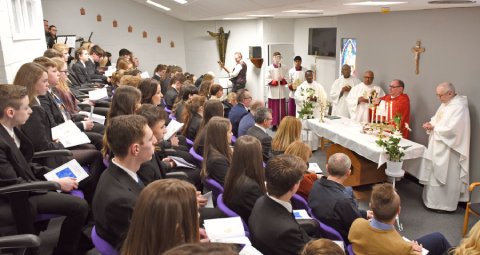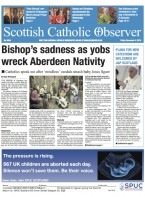December 6 | ![]() 0 COMMENTS
0 COMMENTS ![]() print
print

Real Mass appeal: the responsibility of clergy and Mass in education
In a fast-moving world, Canon Tom Shields explains why the role of priests and of Mass in our schools has never been so important for the Church.
“Everyone seems to be working harder these days. We are all running around like headless chickens. What is the solution, do you think?” I nearly answered, “Go to Mass,” but my friend is not a Catholic and doesn’t really believe in God. Thinking on it, I should have suggested it anyway. Why?
It is to do with the way we think and live. We live in the present, the past and the future all seemingly at the same time. We carry the hurts from yesterday, worrying about the meeting to come, running for the bus now.
Many novels these days flit backwards and forwards. They start at one point in time, but they very quickly transport you to the future or the past. It is as if the novelist is really a painter, going over the canvas from left to right, up and down, until the picture emerges. Sometimes the work is
finished, sometimes not: modern tales for those chasing their own tails.
Meanwhile, we miss so much. We long to recapture that feeling when, during an all-too-brief holiday, we looked at a sunset, the trees turning golden brown, our children playing, seemingly unaware of the passing of time. No wonder practices such as mindfulness and yoga are gaining new enthusiasts every day. It’s like a collective cry of: “Stop the world, I want to get off!”
Worries
It is, nonetheless, both natural and supernatural to move from one period of time to another, to evolve. Being present to the present might be the state we crave, since we waste so much time worrying, but even the most disciplined of minds will time-shift necessarily. Indeed, being stuck in an instant can be harmful and lead to emotional distress and mental ill-health.
Yes, God is a God of the moment, but he is also the Lord of all moments. How we view time and ourselves depends on whether or not we have a sense of direction.
Central to our understanding of time as Catholics is the Eucharist. The presence of Christ in the Mass is not a static one: He is the one who died and rose again for us in the past, brings us from darkness into light now, and will return to bring about the fullness of the Kingdom.
Redefining
Time is not so much suspended in the Eucharist as transformed. Our stories are rewritten, and we are redefined. We are not on a treadmill; our lives are not our work; our anxieties do matter to God. We are brought out of the humdrum and, for a time, reminded of our true dignity.
What’s more, we remember that Christ is present here and now to give us a fresh perspective on ourselves, our neighbour, on creation itself. In giving thanks for what He has done for us, we look to the future with confidence and are able to live more fruitful and happy lives in the present. Life is not just one thing after another.
Celebrating Mass in schools can be the most rewarding, terrifying, and frustrating experience of a priest’s life. Members of staff go on heightened ‘security alert.’ The students often feel awkward and bored, leading to pranks and show-off behaviour; the only good thing being that they get out of class.
Debate
Given debates over religious observance in schools, the increasing number of students coming from secularist families who may request their children to be removed from worship, and also the shortage of priests, we might be tempted to give up on providing Mass in schools. The vast majority of the students who are Catholic don’t attend Mass with any regularity. Perhaps other types of prayer and liturgical services might be more appropriate and life-giving. They are also often easier to manage and engage people of all ages more effectively.
I am for more creativity in prayer, and there is a rich tradition of para-liturgical and devotional practices from which to draw. Working in smaller groups does tend to reduce disruptive behaviour and increase engagement. These experiences can often be quite moving, especially when they take place in the context of school trips or pilgrimages.
But, to use an old phrase, it is the Mass that matters. This is the great gift given to the Church by God to renew the world. This is the worship that defines us as Catholic Christians with something different to offer.
Catechism
It is also the best catechetical instrument known to us: we can learn more about the Church, warts and all, from attending one Mass than by going to 100 teaching sessions. Life is not just about timetables. What I’m suggesting is that we rediscover the insights of the Fathers of the Church, that the Mass, its elements and structures, can help teachers form the catechetical and liturgical life of all Catholic schools.
Prayer throughout the day could be structured better to reflect the rhythm of the Eucharist. When gathered first thing, students could be encouraged to renew themselves by recollecting and asking forgiveness.
A short passage of Scripture could be read, perhaps part of the reading for the weekday Mass. During the day, petition and thanksgiving could be encouraged along with reflection and silent thanksgiving. At the end of the school day, students could be urged to go and live the Good News.
Celebration
Services and para-liturgies might be shaped to ‘introduce’ and prepare for upcoming Eucharistic celebrations, and even exposition could be made available, with the right preparation beforehand.
I wonder if we, as priests, need to make ourselves more not less available to schools, despite the shortage of clergy. Celebrating Mass more often, with smaller groups, with a view to leading whole school Masses might just address a whole raft of problems. Celebrating the Mass is something with which priests are comfortable.
It gives them a reason and a purpose to be in school to do what they do best. A more imaginative and diverse way of looking at chaplaincy and Mass preparation, involving parishioners as well as teachers, might solve the problem of priests feeling awkward in their relationships, particularly with teenagers. They would be there as part of the team with their own sacramental and spiritual role to play.
At Mass, the real presence engages with the real story: Christ, the High Priest, the one who returns to take us to where He is, is also the Christ of the Road to Emmaus, listening to His disciples as they tell their story. It is not time to give up on Mass at school; it is time to rediscover it.










